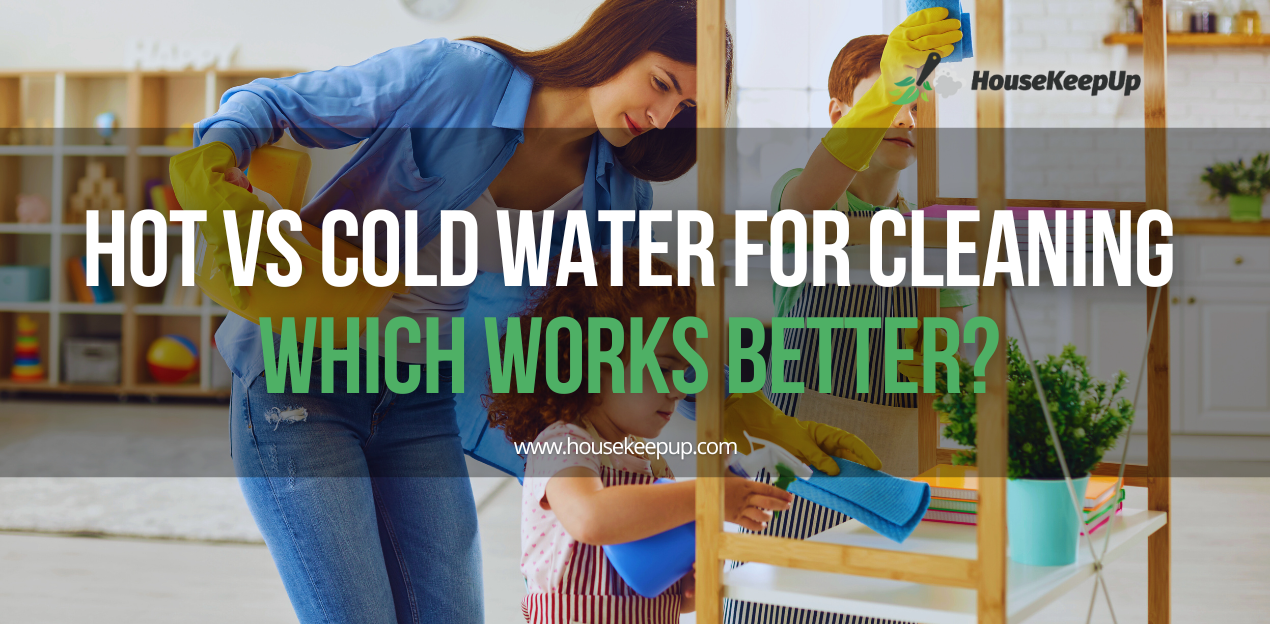
We’ve all been there—standing at the sink, about to tackle a cleaning job, and wondering: hot or cold water? I used to automatically turn the hot water knob for almost every cleaning task, assuming hotter was always better. But after years in the cleaning industry, I’ve learned it’s not that simple.
The temperature of your cleaning water actually matters more than you might think, and using the wrong temperature can sometimes do more harm than good. Let’s dive into when you should reach for hot water, when cold is actually better, and why it makes a difference.

Hot Water: When to Turn Up the Heat
Hot water has long been the go-to for cleaning, and for good reason:
Perfect for These Tasks:
- Cutting through grease and oils: Hot water helps dissolve and lift oil-based dirt, making it ideal for kitchen counters, stovetops, and greasy dishes.
- Killing bacteria: Water needs to be at least 140°F (60°C) to effectively kill most household germs and bacteria.
- Removing sticky residues: Think honey spills, jam, or that mysterious sticky spot on your kitchen floor.
- Laundering heavily soiled items: Hot water helps activate laundry detergents and remove body oils from sheets and towels.
I remember tackling a baking sheet covered in baked-on grease that seemed impossible to clean. Cold water and soap barely touched it, but a soak in hot water loosened everything up in just minutes.
Cold Water: The Unexpected Cleaning Hero
Here’s where many people get it wrong. Cold water actually outperforms hot water in several surprising situations:
Best Uses for Cold Water:
- Protein-based stains: Blood, egg, milk, and other protein stains actually set permanently when exposed to hot water.
- Fresh red wine spills: Cold water prevents the stain from setting while you work on it.
- Mud and dirt: Rinse with cold water first to avoid “cooking” the soil into fabrics.
- Delicate surfaces: Cold water is gentler on certain finishes and materials that might warp or damage with heat.
One summer, my friend spilled red wine on her white carpet and immediately reached for hot water. I quickly stopped her and used cold water instead—the stain came out completely, which wouldn’t have happened with hot.

Temperature Matters: A Practical Guide
To make this really practical, here’s a quick reference guide for common cleaning scenarios:
| Cleaning Task | Best Water Temp | Why It Works |
|---|---|---|
| Kitchen grease | Hot | Dissolves oils and cuts through buildup |
| Blood stains | Cold | Prevents proteins from setting permanently |
| Window washing | Cool to lukewarm | Prevents streaking as water evaporates |
| Bathroom surfaces | Hot | Kills germs and dissolves soap scum |
| Wine/juice spills | Cold | Prevents dye from setting |
| Mopping floors | Hot | Better dirt removal and faster drying |
| Delicate glassware | Warm (not hot) | Cleans effectively without thermal shock |
| Laundry pre-treatment | Match to stain type | Hot for grease, cold for protein |
Energy and Environmental Considerations
Beyond cleaning effectiveness, there’s also the energy aspect to consider. Heating water accounts for a significant portion of household energy use. By using cold water when appropriate, you can:
- Save on utility bills
- Reduce your carbon footprint
- Extend the life of delicate fabrics and surfaces
I’ve cut my own hot water usage in half simply by being more mindful about which cleaning tasks truly need hot water.
The Best of Both Worlds
For many cleaning tasks, I’ve found that a two-temperature approach works wonders:
- Start with cold water to remove loose dirt and prevent stains from setting
- Follow up with hot water for sanitizing and final cleaning
This method gives you the benefits of both temperatures and often yields better results than either temperature alone.

Making the Right Choice Every Time
The next time you’re about to clean something, take a second to consider:
- What type of dirt/stain are you dealing with?
- Is the material heat-sensitive?
- Do you need to sanitize the surface?
These quick questions will guide you to the right temperature choice and better cleaning results.
I used to think cleaning was just about elbow grease and the right products, but understanding these temperature basics has made my cleaning more effective and efficient. Sometimes it’s the simplest details that make the biggest difference.
Frequently Asked Questions
Will hot water damage my clothing when doing laundry?
It depends on the fabric. Hot water can damage delicate fabrics, cause shrinking, and set certain stains. Check garment care labels and use hot water primarily for whites, heavily soiled items, and killing dust mites. Use cold water for colored fabrics, delicates, and protein-based stains.
Is hot water better at removing all types of stains?
No, hot water is only better for certain stains. Hot water works best on grease, oils, and sticky residues. However, for protein-based stains (blood, egg, milk), cold water is actually more effective because hot water can "cook" proteins into the fabric, making stains permanent.
Does hot water really kill germs when cleaning?
Yes, but it needs to be very hot. Water needs to reach at least 140°F (60°C) to effectively kill most household bacteria and germs. Most household hot water isn't quite this hot, so for true disinfection, you'll still need to use a proper disinfectant product alongside hot water.
Is using hot water for cleaning bad for the environment?
Heating water does consume energy, so using hot water does have a higher environmental impact than cold water. Using cold water when appropriate (for protein stains, delicate surfaces, and general light cleaning) can reduce your energy consumption and carbon footprint.
What temperature water should I use to clean windows and mirrors?
Cool to lukewarm water is best for windows and mirrors. Hot water evaporates too quickly and can lead to streaking, while cold water with a small amount of vinegar or window cleaner typically provides the best streak-free results.
Can I save money by washing everything in cold water?
Yes! Using cold water for cleaning and laundry when appropriate can significantly reduce your energy bills. About 90% of the energy used in washing machines goes toward heating water, so cold-water washing is much more economical while still being effective for many cleaning tasks.
Not sure When to Use Hot or Cold Water for Cleaning? We Do!
Skip the temperature guesswork. Our Chicago cleaning experts know exactly which water temperature works best for every surface in your home, ensuring a perfect clean every time.





0 Comments